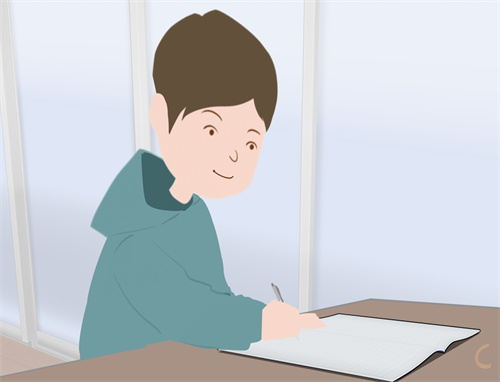知识掌握的巅峰,应该在一轮复习之后,也就是在你把所有知识重新捡起来之后。这样看来,应对高二这一变化的较优选择,下面给大家带来一些关于高二英语必修四知识点,希望对大家有所帮助。
高二英语必修四知识点1
1. amuse
「课文原句」Parks provide people with a place to amuse themselves and to escape their busy lives for a while. (P33)
「名师点拨」amuse vt. 意为“使高兴;使开心”,和please(取悦于;让……高兴)是近义词。amuse oneself意为“自娱自乐;消遣”。amuse的名词形式是amusement.如:I think it amuses him to see people make fools of themselves. I bought a magazine to amuse myself while I was on the train. They are more than amusement parks with rides, such as a Ferris wheel, merry-go-round or a roller coaster. (P33)
Carl came last in the race, much to my amusement.「知识拓展」amused adj. 意为“逗乐的;觉得好笑的”,常用be amused (at / by sth),指“觉得有趣;好笑;以……为乐”。如:She was very amused by / at your comments. Amused by the flying kites, the child stopped crying.
2. various
「课文原句」Though parks share this basic purpose, they find various ways to meet this need. (P33)
「名师点拨」various adj. 意为“不同的;各种各样的”,相当于different kinds of,后接复数名词。如:At the meeting, the people present expressed their various opinions. The students were late for various reasons.「知识拓展」various是由动词vary(变化)派生而来的形容词,它的副词形式是variously.variety是名词,意为“有变化”,用a variety of表示“各种各样的;多种多样的”,后接复数名词,可与various互用。如:These new parks have a variety of things to see and do. (P33)
3. charge
「课文原句」They all charge money for admission, and for the rides and shows in the park. (P33)
「名师点拨」charge通常作及物动词,意为“收(费);索(价)”,此时charge后接宾语(被收费的对象)和钱数;如果接购买的商品或其它原因,用for连接。如:I‘ll charge you five dollars. How much do you charge for a haircut?
charge还可以表示“把……归咎于(to, on, upon);告发;在控告(with)”。如:Bob was charged with the murder, but he refused to admit it.
「知识拓展」charge作名词时,构成许多固定搭配:in charge(主管);in charge of(负责某事);in the charge of(由……管);take charge of(负责管理)。如:The doctor in charge told us to be calm. Who is in charge of the school instead of Mr Black?
The factory has been in the charge of the new boss for five months. Can you take charge of this class please, Miss Li?
4. profit
「课文原句」The big companies that own them parks except to make a profit not just by the charges for admission… (P33)
「名师点拨」profit n.意为“利润;经济上的好处”,既可数也不可数,用作复数的场合较多;也可译为“好处;益处(不可数)”。make a profit指“获得利润”。如:Tom said he would give up his profits if there were no explanations to give him. She makes a big profit from selling waste material to textile companies.「知识拓展」profit也可作及物或不及物动词,profit by意为“从……中得到好处”。如:You must make it clear what it will profit me. You may profit by the experience of others.
5. advance
「课文原句」… and there are future parks, where people can go on imaginary trips to space and use advanced computer techniques to experience life in the future. (P34)
「名师点拨」advanced adj. 意为“高级的;先进的”,其动词形式是advance,可作及物动词或不及物动词,意为“推进;促进;提前”。如:The Party Committee is going to advance our career to a new stage. (及物动词)
The date of the meeting has been advanced from Friday to Monday. (及物动词)
After having studied abroad for three years, they didn‘t advance in knowledge at all. (不及物动词)
高二英语必修四知识点2
过去分词做状语
Worriedaboutthejourney,Iwasunsettledforthefirstfewdays.
Well-knownfortheirexpertise,hisparents’company…..
Confusedbythenewsurroundings,Iwashitbythelackoffreshair.
Exhausted,Islidintothebedandfellfastasleep.
过去分词作状语:过去分词作状语时,说明动作发生的背景或情况,其等同于一个状语从句。vt过去分词作状语时与主句主语构成被动关系,表示被动和完成,vi过去分词表示状态或动作的完成。
Heated,waterchangesintosteam.
Theprofessorcamein,followedbyagroupofyoungpeople.
1作原因状语,等于as/since/because引导从句
Movedbywhatshesaid,wecouldn’thelpcrying.=(Aswearemovedbywhatshesaid…
2作时间状语,等于when引导时间从句,如果分词表示的动作与谓语的动作同时发生,可在分词前加when/while/until等使时间意义更明确。
Whenheated,watercanbechangedintosteam.
Seenfromthehill,theparklooksverybeautiful.=(Whentheparkisseenfromthehill…
3作条件状语等于if/whether引导从句
Givenmoreattention,thecabbagescouldhavegrownbetter.=(Iftheyhavebeengivenmoreattention….
Comparedwithyou,westillhavealongwaytogo=(Ifwearecomparedwithyou…
4作方式或伴随状语
Theactresscamein,followedbyherfans.
Shesatbythewindow,lostinthought.
5作让步状语
Muchtired,hestillkeptonworking.=(Althoughhewastired,)he….
6独立主格结构:当分词的逻辑主语不是主句主语时,分词可以有自己独立的逻辑主语,这种结构称为独立主格结构。常用来表示伴随情况。
Theboyrushedintotheclassroom,hisfacecoveredwithsweat.
Allthingsconsidered,yourarticleisofgreatvaluethanhers.
Rewritewithproperconjunctions
Example:Unitedwestand,dividedwefall.
Ifweareunited,wewillstand,butifwearedivided,wewillfall.
1Askedwhathadhappened,hetoldusaboutit.
→Whenhewasaskedwhathadhappened,…
2Wellknownforhisexpertadvice,hereceivedmanyinvitationstogivelectures.
→Becausehewaswellknownforhisexpertadvice,…
3Givenmoretime,wewouldbeabletodotheworkmuchbetter.
Ifweweregivenmoretime,
4OncetranslatedintoChinese,thebookbecameverypopularamongChineseteenagers.
OnceitwastranslatedintoChinese,
5Deeplyinterestedinmedicine,shedecidedtobecomeadoctor.
Becauseshewasdeeplyinterestedinmedicine,
6Leftaloneathome,Samdidnotfeelafraidatall.
Althoughhewasleftaloneathome,
现在分词与过去分词作状语
现在分词作状语时,与其逻辑主语之间是主动关系,;而过去分词与其逻辑主语之间则表示被动关系。
Seeingthesepictures,Icouldn’thelpthinkingofthosedayswhenIwasinBeijing.Seenfromthetopofathirty-storeyedbuilding,Beijinglooksmoremagnificent.(see)
选择现在分词还是过去分词,关键看主句的主语。如分词的动作是主句的主语发出,分词就选用现在分词,反之就用过去分词。例如:
Usedforalongtime,thebooklooksold.
由于用了很长时间,这本书看上去很旧。
Usingthebook,Ifindituseful.
在使用的过程中,我发现这本书很有用
注意:1.系表示主语所处的状态
_____inthought,healmostranintothecarinfrontofhim.(lose)
______inwhite,shelooksmorebeautiful.(dress)
belostin
bedressedin
beinterestedin
bedevotedto
besupposedto?becaughtintherain
beseatedin
bepreparedfor
bedeterminedto
2.不与主语保持一致的固定结构
generallyspeaking一般说来
strictly/franklyspeaking严格地说/坦白地说
judgingfrom从…判断
allthingsconsidered从整体来看
takingallthingsintoconsideration全面看来
例如:Judgingfromhisface,hemustbeill.从他的脸色看,他一定是病了。
Generallyspeaking,dogscanrunfasterthanpigs.
总的来说,狗比猪跑得快。(speaking不是dogs的动作)
Practice
1.CompleteeachsentencesusingtheP.P.oftherightverb.
buildfrightentrapfollowshootseeexamine
1________bynoisesinthenight,thegirlnolongerdaredtosleepinherroom.
2Theladyreturnedhome,________bytwopolicemen.
3Afterhavingbeen_________carefully,theroomwaslockedagain.
4.______in1949,theexhibitionhallisover50yearsold.
5_____fromadistance,theOperaHouselookslikeshipsails.
6If_____inaburningbuilding,youshouldsendforhelp.
7Although______intheleg,hecontinuedfiringatthepolice.
练习
1____time,hewillmakeafirst-classtennisplayer.
AHavinggivenBTogiveCGivingDGiven
2___in1636,HarvardisoneofthemostfamousuniversitiesintheUnitedStates.
ABeingfoundedBItwasfounded
CFoundedDFounding
3Unless__tospeak,youshouldremainsilentattheconference.
AinvitedBinviting
CbeinginvitedDhavinginvited
4___,buthestillcouldn’tunderstandit.
AHehadbeentoldmanytimes
BHavingbeentoldmanytimes
CToldmanytimes
DAlthoughhehadbeentoldmanytimes
5Whenfirst___tothemarket,theseproductsenjoyedgreatsuccess.
AintroducingBintroduced
CintroduceDbeingintroduced
6Thereseemedtobenothing___todobut___forthedoctor.
Aleave/sendBleft/tosend
Cleft/sendDleaving/send
作介词but,expect,besides的宾语,前面又有实意动词do时,不定式通常省去to
7____everywhere,thewolveshadnowhere___themselves.
AHunting/hidingBTohunt/tohide
CHunted/hidingDHunted/tohide
8.The___morning,thefathercameintothelonelyhouse,___byhisnaughtyboy.
A.following,followingB.followed,followed
C.following,followedD.followed,following
9.Mrs.Whitewasgladtoseethenurse___afterhersonandwaspleasedtoseetheboywell___careofinthenursery.
A.looked;takenB.looking;taken
C.looked;tookD.looking;taking
10.Themurdererwasbroughtin,withhishands___behindhisback.
A.beingtiedB.havingtied
C.tobetiedD.tied
11.___moreattention,thetreescouldhavegrownbetter.
A.GivenB.Togive
C.GivingD.Havinggiven
高二英语必修四知识点3
1.非谓语动词的构成和语法功能及用法对比。
2.非谓语动词的完成式、被动式的用法和特点。
3.非谓语动词的复合结构及否定形式。
4.不定式与动名词,动名词与现在分词,现在分词与过去分词,分词作状语与独立结构等用法对比。
5.不定式和动名词在及物动词后作宾语的区别是考查的热点。
6.过去分词作定语,不定式和分词作宾语补足语的用法。
7.不定式标志to和介词to的用法判断等。
8.带to与不带to的不定式的用法及区别。
考点一、考查谓语动词与非谓语动词的识别
英语句子至少应该包括主语与谓语两部分, 而多数情况下谓语都由动词来充当。如果对句子成分划分不清,把谓语动词与非谓语动词混淆, 做题效果可想而知。要克服这一毛病,关键在于正确判断、识别动词在句中是否充当谓语。如:
1. The children (play) _____ the violin over there will go on the stage next week.
根据句子结构,我们可以看出这是一个简单句。主语是The children,谓语部分是will go on the stage,动词play显然在句中不作谓语,应用非谓语动词形式。依据play与它的逻辑主语children之间的主动关系以及拉小提琴动作正在进行,可以判断用现在分词作定语修饰children,意为“正在那边拉小提琴的小孩”,因而正确答案为playing。
考点二、考查作状语的非谓语动词的辨析
作状语的非谓语动词主要考查其各种形式的辨析,即是选择动词不定式、现在分词还是过去分词作状语, 不同的状语对非谓语动词的要求不同。 动词不定式主要作目的、结果和原因状语;现在分词和过去分词主要作时间、原因、条件、让步、方式和伴随状语,两者不同之处在于:现在分词作状语时,现在分词的动作就是句子主语的动作,即它的逻辑主语就是句子的主语,它们之间的关系是主动关系,而过去分词作状语时,虽然它的逻辑主语也是句子的主语,但过去分词表示的动作是句子主语承受的动作,它们之间的关系是被动关系。请看下面例题:
1.____tired of Tom’s all-talk-no-action attitude, Julia decided to do the job all by herself.
A) To get B) To have got
C) Getting D) Have got
一般来说,在句子中没有连接词的情况下, 逗号是无力连接两个句子的。据此,首先可以确定 这是一个简单句,非谓语动词短语放在句首作状语。依据非谓语动词短语get tired of与其逻辑主语Julia之间的主动关系,以及谓语动词与非谓语动词所表示的动作几乎同时发生,没有明显的先后顺序,可以断定应用现在分词一般式作原因状语,即“由于厌倦了Tom只说不做的工作态度”,故正确答案为C。
考点三、考查非谓语动词逻辑主语的分辨
非谓语动词虽然在句中不作谓语,但仍然有自己逻辑上的主语。历年各种考试的重点在于正确分辨非谓语动词的逻辑主语是什么,两者之间是主动关系还是被动关系,特别是非谓语动词作状语的时候。我们知道,当非谓语动词放在句首作状语的时候,一般来说,它的逻辑主语就是句子的主语,那么,当它的逻辑主语不是句子的主语时,又会出现什么现象呢?请看下面例题:
1. The last bus (go)____, we had to walk home.
2. Weather (permit)____, the spaceship will be launched tomorrow evening.
这两个非谓语动词短语的逻辑主语都不是句子的主语,而是分别有它自己的逻辑主语,即“是 末班车开走了,而不是我们走了”,“是天气允许,而不是飞船允许”,这种现象或结构就是独立主格结构。依据非谓语动词与其逻辑主语的主动关系,正确答案分别为having gone和permitting。
请再看下面例题:
3. The work (finish) _____, they may go home.
4. The problem (discuss) _____ at the meeting- room now, the workers had to wait outdoors.
同样,这两道题的结构也是独立主格结构。依据非谓语动词与其逻辑主语之间的被动关系以及非谓语动词所表示动作发生的时间性,可以判断正确答案分别为finished(已完成)和being discussed(正在进行)。
考点四、考查非谓语动词时态与语态的把握
非谓语动词虽然在句中不作谓语,但它仍然具有动词的特征,即可以有自己的主语(逻辑主语),也可以有时态和语态的变化。非谓语动词的各种时态形式都是依据句子的谓语动词的时态形式而变化的。一般情况下,如果非谓语动词所表示的动作在谓语动词所表示的动作同时或之后发生, 就用非谓语动词的一般式或进行式(侧重强调动作正在进行);如果非谓语动词所表示的动作在谓语动词所表示的动作之前发生,就用非谓语动词的完成式(特别强调动作发生的先后)。非谓语动词的语态在于正确把握非谓语动词与其逻辑主语之间是主动关系还是被动关系。例如:
____ that Bob had got promoted, his friends came to congratulate him.
A) Heard B) Having heard
C) Hear D) To hear
依据非谓语动词hear与其逻辑主语his friends之间的主动关系,以及前后句的逻辑关系,可以断定用现在分词形式来作时间状语,再根据现在分词的动作“听说”发生在主要谓语动词“来”之前,由此判断应该用现在分词的完成式(只用作状语时使用),意为“听说Bob已得到提升,他的朋友都来向他表示祝贺”,故正确答案为B。
考点五、考查非谓语动词作主语时句式的转变
非谓语动词(动词不定式或动名词)作主语主要考查其句式的转变,习惯上通常把it作为形式主语放在句首,作题时要善于分辨这种形式上的转变。请看下面例题:
1. It is an honour for me (be) _____ your English teacher.
2. It is no use of us (wait) _____ at home like this.
根据对句式的分析,可以判断出It是形式主语,真正的主语由非谓语动词(动词不定式或动名词)来充当。依据表语的特性以及句式的特点,我们可以断定第1题应该填动词不定式,即to be,第2题应该填动名词,即waiting。
六、考查作定语的非谓语动词的判断
非谓语动词作定语主要考查非谓语动词作后置定语的情况,这里关键要把握住非谓语动词与其逻辑主语之间是主动行为还是被动行为,以及非谓语动词表示的动作发生的时间性,即是正在进行或已经完成还是将要发生。一般来说,用现在分词一般式作定语往往表示动作是主动行为且正在进行当中,如果动作是被动行为且正在进行当中,就用现在分词一般式的被动语态;用过去分词作定语往往表示动作是被动行为且已经完成; 用动词不定式作定语表示将要发生的动作,如果是被动行为,就用动词不定式一般式的被动语态。 例如:
1. The boy (cry)____ over there is my younger brother.
依据cry与它的逻辑主语The boy之间的主动关系和cry的动作正在进行,所以用现在分词作定语修饰boy,因而正确答案为crying。
【精选试题】 名校模拟题及其答案
1. Everyone in our class was working hard and doing what we could _______a good college.
A. enter。mB. to enter
C. entering。mD. entered
2He ran as fast as he could _____ to catch the early bus.
A. to hope。mB. hope
C. hoping。mD. hoped
3.He spent every minute he could _____ spoken English.
A. practise。mB. to practise
C. practising。mD. practised
4.Before going abroad he devoted all he could _______ his oral English.
A. improve。mB. to improve
C. improvingD. to improving
5. He knows nothing about it, so he can’t help _______ any of your work.
高二英语必修四知识点4
一、不定式做主语:
1、不定式做主语一般表示具体的某次动作。===动名词doing 表示习惯的,经常的动作。
e.g: To finish the building in a month is difficult.
To do such things is foolish.
To see is to believe. (对等)
注: 1). 不定式作主语时,谓语用单数
2). 当主语较长,谓语较短时,常用it做形式主语,而将不定式放到谓语的后面。
it做形式主语,不定式放在谓语动词之后常用于下列结构中:
(1)It is/was +adj.+of sb. to do…
(2) It is +adj.+for sb.+to do…
It is easy / difficult / hard / foolish / unwise / right / wrong / unnecessary
(3) it is +a +名词+ to do...
It is a pity / a pleasure / a pleasant thing / one’s duty / an honor / a shame / a crime / no easy job… to do
It takes (sb.) some time / courage / patience …to do…
It requires courage / patience / hard work… to do…
-注意: probable 和 possible 均可作表语,但possible可以用不定式作真实主语, 而probable不能用不定式作真实主语。
It is probable for him to come to the meeting.(错)
It is possible for him to come to the meeting.
It is possible / probable that he will come to the meeting.
二、不定式做表语
主语是以aim duty hope idea intention plan job suggestion wish purpose task 等为中心词的名词词组 或以 what 引导的名词性从句表示,后面的不定式说明其内容, 不定式作表语常表示将来或现在的动作或状态。
eg :My idea is to climb the mountain from the north.
Your mistake was not to write that letter.
What I would suggest is to start work at once.
三 、动词不定式作宾语
以不定式结构为宾语的动词有:
ask, agree, care, choose, demand, decide, expect, fail, help, hope, learn, manage, offer, plan, prepare, pretend, promise, refuse, want, wish等只能用动词不定式作宾语
口诀(接不定式作宾语的动词)
想要学习 早打算( want learn plan)
快准备 有希望( prepare hope wish expect)
同意否 供选择(agree offer choose)
决定了 已答应(decide be determined promise)
尽力去 着手做(manage undertake)
别拒绝 别假装(refuse pretend)
失败不是属于你(fail)
e.g.Tom refused to lend me his pen.
We hope to get there before dark.
The girl decided to do it herself.
-注意:某些及物动词可用-ing也可用动词不定式作宾语但意义不同的有
stop go on remember forget
regret try mean can’t help
be used to
高二英语必修四知识点相关文章:
★ 高二英语必背知识点重点归纳
★ 高二英语必修4Unit3重点短语
★ 人教版英语必修4第四单元重点单词解析
★ 高二英语必修四必背单词,学好英语的好习惯(2)
★ 高二英语必修四必背单词,学好英语的好习惯
★ 高二英语必修四必背单词,学好英语的好习惯
★ 高中英语知识归纳笔记
★ 高二英语必修5知识点
★ 英语必修四Unit5重点英语单词解析
★ 高中政治必修四知识点整理
上一篇:高二英语高效学习方法和技巧有哪些
下一篇:人教版高二英语知识点总结






